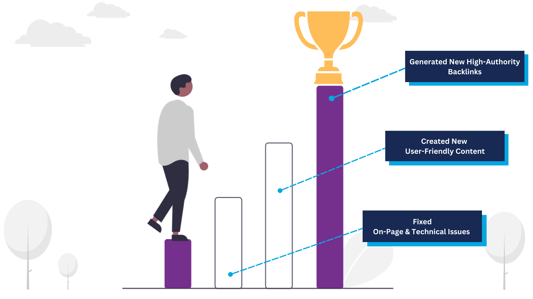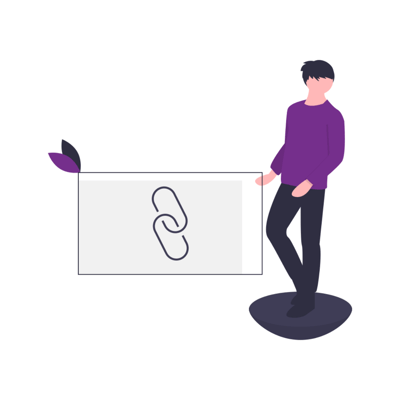Search Engine Optimization

Feeling Lost
with SEO?
We get it. SEO often feels like a shifting maze with no clear path to success. Unfortunately.. thats a pretty accurate analogy.
What makes it even worse? The industry is filled with false-prophets and black-hat tactics that do more harm than good.
You may know this if you've had a bad experience with an agency or freelancer already. Where do you go from here? Keep reading and hopefully we can point you in the right direction.
Table of contents
Which SEO topics do you want to learn more about?
.png?width=162&height=150&name=undraw_Conversation_re_c26v%20(1).png)
Know the facts about SEO.
.png?width=210&height=150&name=undraw_Programming_re_kg9v%20(1).png)
What should be included?
.png?width=197&height=150&name=undraw_Web_developer_re_h7ie%20(1).png)
Page Titles, Meta Descriptions, why are they important?
.png?width=229&height=150&name=undraw_fixing_bugs_w7gi%20(1).png)
Where SEO & Web Development come together

EAT Score, Blogging, & More

Learn about link building strategies and Site Authority scores.

Get the basic principles of great Local SEO

Our most asked questions about SEO
Myth #1
"SEO IS DEAD"
Oh really, tell that to the 93% of online experiences that start with a search engine.
In fact, a study by BrightEdge shows that organic search is responsible for 53% of all site traffic.
Myth #2
"Ranking is Just about picking the right keywords"
Wrong. You can target the perfect keywords, but without a competitive domain authority score or rating.. you won't rank #1.
Myth #3
"The more backlinks the better"
Incorrect. Quality over quantity. A few high-quality, relevant backlinks can be more beneficial than a large number of low-quality links.
Myth #4
"I'll never outrank large enterprise sites"
The notion that a smaller website can't outrank a larger enterprise website is a common misconception. While it's true that larger sites often have more resources for SEO, content creation, and backlinks, that doesn't automatically guarantee higher rankings.
The factors listed on this page should help explain why.
SEO Secrets..
shortcuts.. and silver bullets..
They don't exist, especially if you want long-term results.
If someone is pitching you otherwise, consider that a red flag.
Or, proceed with extreme caution and manage your expectations.


SEO success..
often requires many tactics at different stages.
Let's dive into what those are, when they should typically happen, and how they contribute to the big picture.

SEO AuditS
"A good auto mechanic may spend 10 minutes diagnosing a problem, then start ordering parts for your car.
A great mechanic spends an hour diagnosing the problem, and then orders the one part that fixes the issue"
Which mechanic would you pick?
SEO Audits aren't much different. The "proposed solutions" can be expensive.
Some SEO audits may recommend a complete website rebuild, but be cautious with that recommendation.
Tools like Semrush, Moz, and ahrefs offer powerful audit tools that make crawling and diagnosing on-page SEO issues easier.
While they provide guidance on fixing them, they won't create the strategy for you.
questions Your
SEO Audit
should answer
What on-page issues are present?
404s, redirect chains, duplicate page titles etc
Is my site authoritative?
DA score, backlink profile, content that demonstrates EAT
What are my top-performing pages and keywords?
This will help you prioritize your efforts
Which keywords SHOULD I be targeting?
This helps determine content edits or new content creation
Who are my top (search) competitors?
This might surprise you with new competitors you were unaware of

Onpage SEO
"Onpage SEO" is another industry term for this best practice
Simply put, it sets out to resolve the issues you found in your audit.
It also helps to assign targeted keywords to each page (typically called a keyword map).
Generally speaking, before you start investing precious time and energy into creating new content.. its important to make sure you are building everything from a solution (SEO) foundation.
what to expect
from onpage SEO
An SEO Keyword Map
Helps to assign targeted keywords to each page and gives you a better picture of the new pages you'll need to create
Page titles, meta descriptions, image alt text
Overhauled to help increase rankings for your top keywords and entice users to click through to your site
Removal of 404s, redirect issues, broken links, page speed issues etc
Some of these may require help from your developer

TEchnical SEO
Technical SEO refers to the optimization of website and server configurations to help search engine spiders crawl and index your site more effectively.
It focuses on improving site speed, mobile-friendliness, internal linking, and other backend features that influence search engine rankings.
Unlike on-page SEO, which deals with content and user experience, technical SEO ensures that the website's infrastructure is sound for search engine algorithms.
It's the foundation that gives your content the best chance to rank for relevant keywords and phrases.
WHAT TO MIGHT EXPECT FROM A TECHNICAL SEO PROJECT
Crawl Optimization: Ensuring that search engines can easily crawl and index the website, often through the use of a robots.txt file and XML sitemaps.
Page Speed Optimization: Techniques to improve website load time, such as image compression, browser caching, and script deferment.
URL (Re)Structure: Refining the URL structure to be SEO-friendly, often making it more readable and including target keywords.
Canonical Tags: Setting up canonical tags to prevent duplicate content issues.
Schema Markup: Implementing or optimizing structured data to enhance search engine understanding of the site's content.
Server Optimization: Ensuring the server is configured for optimal speed and crawl efficiency, which may include CDN implementation or server redirects.

SEO Content Creation
Now that you've established a good foundation, its time to start creating new, authoritative content.
To better understand what that means, you'll want to know about these two important acronyms.
Google's E-E-A-T stands for Experience, Expertise, Authoritativeness, and Trustworthiness.
These are criteria that Google uses to evaluate the quality of web content, especially for YMYL (Your Money Your Life) topics.
High E-E-A-T scores can positively impact a website's search ranking.
E - EXPERIENCE
SHOWING EXPERIENCE IN WITH YOUR CONTENT
First-Hand Knowledge: Share your personal experiences and insights related to the topic. This adds a layer of authenticity to your content.
Visual Proof: Use unique photos, videos, or other visual elements to support your first-hand experience. This could be product photos, screenshots, or even video demonstrations.
E - Expertise
DEMONSTRATING EXPERTISE
Author Credentials: Clearly display the qualifications of the content creator, especially for YMYL (Your Money or Your Life) topics.
In-Depth Content: Provide comprehensive and detailed content that fully addresses the topic.
User-Centric: Write in a way that speaks to the user's query and solves their problem.
A - Authority
HOW TO SHOW AUTHORITY
Cite Sources: Back up claims with credible sources, especially for statistical or scientific information.
Internal Linking: Use internal links to guide users to other authoritative pages on your site.
External Recognition: Gain mentions or backlinks from authoritative sites in your industry.
T - Trustworthiness
HOW TO CREATE TRUSTWORTHY CONTENT
Transparency: Clearly state who is responsible for the content and how to contact them.
Secure and Accessible Website: Make sure your website is secure (HTTPS) and easily navigable.
User Reviews: Encourage and display user reviews or testimonials.

SEO Link Building
Link building is the strategic objective to acquire links from other websites that point back to your own web page. Search engines view backlinks to your site as a sign of authority and expertise. This is what you want if you are attempting to rank for highly competitive search phrases.
We've listed a few of the top SEO backlink building strategies below. There are infinitely more ways to acquire backlinks, but these are some of the most common and important to know.
cold outreach
The easiest way to explain cold outreach as a strategy to build links is to think of it like a cold sales outreach.
This can be done via email, submitting a contact form on a website, or even using LinkedIn messaging has become popular as of late.
Your "pitch" should include reasons why a link back to your content will help improve the quality of their existing page or blog.
Try to convey this through a lens where their user's experience will be improved.
Guest posting
Guest posting is a strategic SEO technique where you write and publish an article on a website other than your own.
This still requires an element of cold outreach, but your offer is more substantial in that you have already offered most of the content for the publisher.
Typically, the host website allows you to include a link back to your own site within the article or in an author bio.
It's a win-win: the host site gets valuable content, and you get a backlink that boosts your SEO.
broken
link building
Broken link building involves identifying broken external links on other websites in your niche and then reaching out to suggest linking to your own content instead.
This strategy is highly effective because nobody wants to direct visitors to broken pages, and you are offering a helpful alternative.
A simple way to initiate broken link building is by searching for broken pages on your competitors' websites.
find unlinked
brand mentions
An unlinked brand mention is when a website mentions you or your business without actually linking to you.
This strategy works great because, with a gentle nudge, most site owners are happy to turn your unlinked mention into a link.
To quickly find unlinked mentions, you can use a tool like Google's Alerts.

Local SEO
Local SEO focuses on optimizing a business's online presence to attract customers from specific geographic locations. This involves tactics like local keyword optimization, Google My Business listings, and local citations. The goal is to appear in local search results, such as "near me" queries or map listings, to drive foot traffic to physical locations.
National SEO, on the other hand, aims to rank a website across a broader, often country-wide, audience. It involves more generalized keywords and a focus on broader topics. The competition is usually higher, and the strategies may involve more complex content marketing and link-building efforts.
learning
local SEO Basics
In Local SEO, business citations play a vital role in boosting your local search rankings.
Ensuring NAP (Name, Address, Phone Number) consistency across these citations is crucial, as search engines use this uniform information to establish your business's credibility and relevance.
.png?width=400&height=367&name=undraw_Winners_re_wr1l%20(1).png)
You made it!
Were these explanations helpful?
Do you feel more confident when discussing SEO strategies?
We certainly hope so!
There was a lot of time and effort into distilling these concepts into easy to consume chunks from years of learning SEO (the hard way) ourselves.
Want a way to say thanks? Its super easy.
Just share this content with others who might also appreciate it.
Q: What is SEO and why is it important?
A: SEO stands for Search Engine Optimization. It's the practice of optimizing your website to rank higher in search engine results, thereby increasing the quantity and quality of traffic to your site. SEO is important because higher rankings result in more visibility, more clicks, and potentially more conversions.
Q: How long does it take to see results from SEO?
A: The time it takes to see results from SEO can vary widely based on various factors like the competitiveness of the industry, the age of the website, and the strategies employed. Generally, you can expect to see some initial improvements in 3-6 months, but significant results often take 6-12 months.
Q: What are keywords and how do I choose them?
A: Keywords are terms or phrases that people use to search for information on search engines. Choosing the right keywords involves research to find terms that are relevant to your business, have high search volume, and are less competitive. Tools like Google Keyword Planner, SEMrush, and Ahrefs can help in keyword research.
Q: What is on-page and off-page SEO?
A: On-page SEO refers to optimizations you make directly on your website, such as meta tags, headers, and content quality. Off-page SEO refers to actions taken outside of your website to improve its authority, like backlinks from other websites.
Q: What is a backlink and why is it important?
A: A backlink is a link from one website to another. Backlinks are important because they signal to search engines that your content is valuable and authoritative, which can improve your rankings.
Q: What is local SEO?
A: Local SEO is the practice of optimizing your website to appear in local search results. This is crucial for small businesses looking to attract customers in a specific geographic area. It involves optimizing your Google My Business listing, acquiring local backlinks, and local keyword optimization.
Q: How do I measure the success of my SEO efforts?
A: Success in SEO can be measured using various metrics like organic traffic, keyword rankings, and conversion rates. Tools like Google Analytics and Google Search Console provide valuable insights into these metrics.
Q: What is a 301 redirect and when should I use it?
A: A 301 redirect is a permanent redirect from one URL to another. It should be used when you're moving content from one page to another or merging two similar pages to preserve the SEO value of the original page.
Q: What is mobile SEO and why is it important?
A: Mobile SEO is the optimization of your website for users on mobile devices. It's important because a significant portion of web traffic comes from mobile devices, and Google uses mobile-first indexing, meaning it primarily uses the mobile version of a site for ranking and indexing.
Q: What are long-tail keywords?
A: Long-tail keywords are longer, more specific keyword phrases that are less competitive and often have a higher conversion rate. For example, "women's leather boots" is a long-tail keyword compared to the more generic "boots."